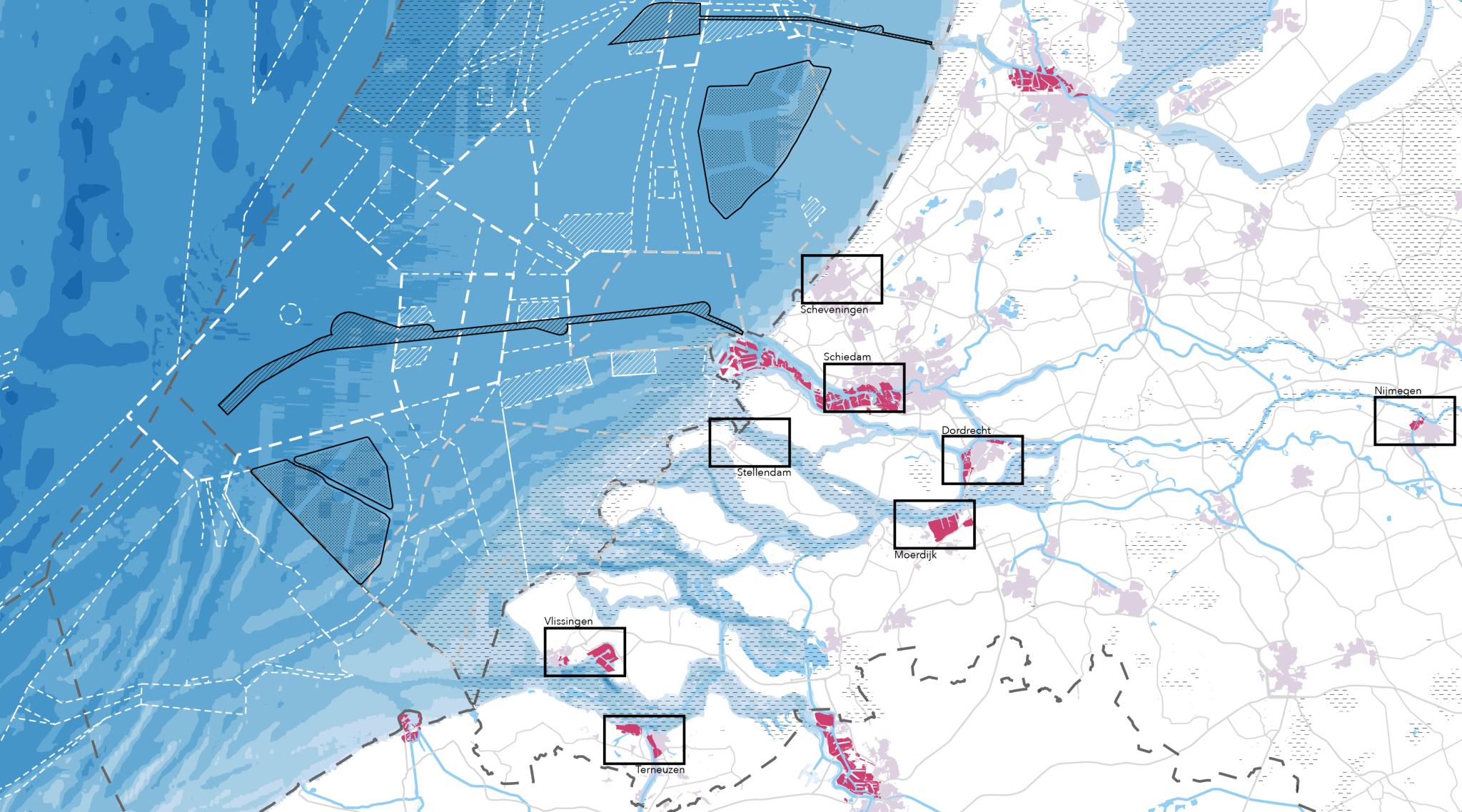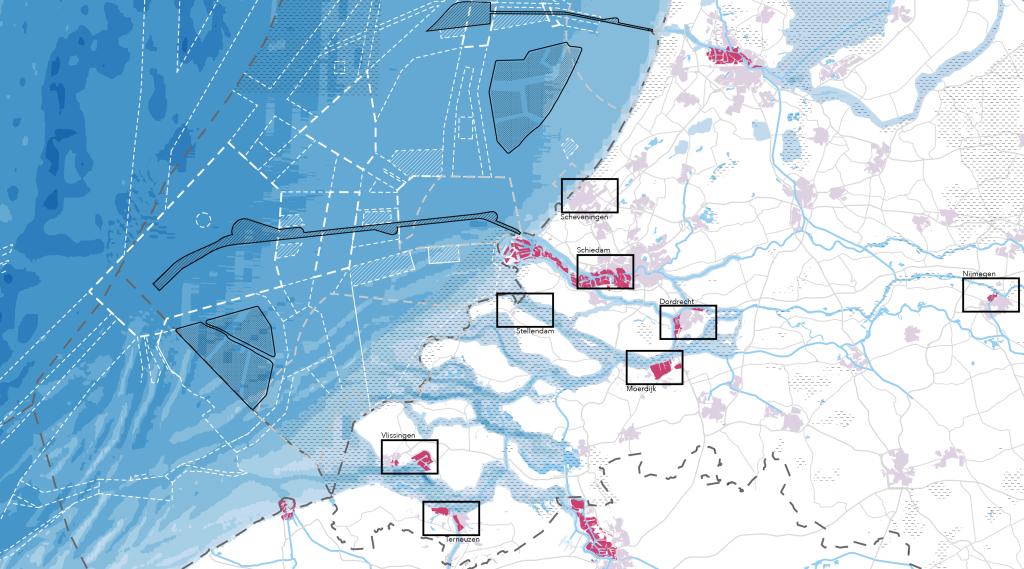PCF Talk #56 – Agenda Monthly Meeting – Hybrid
This is a hybrid event, please join in person, or via the zoom link below!
9:00 - 9:10
Introduction of the Day: Yvonne van Mil (TU Delft, PCF)
I Public Event
9:10 - 10:20
Keynote Lecture: Small Ports - Big Challenges (PCF Thematic Research Group)
Presenters: Alankrita Sarkar, Mila Avellar Montezuma, Paolo de Martino, Lukas Höller and Yvonne van Mil.

Small ports of Dutch delta. Map developed by Sacha Oberski, Taken from Vereniging Delta Metropool
Large ports such as Rotterdam and Shanghai dominate discussions on trade and urban development, overshadowing the crucial contributions of small and medium-sized ports such as Dordrecht, Nijmegen and Koblenz. These smaller ports support local industries, foster community links and complement larger hubs, while also playing a key role in climate adaptation and resilience strategies.
This keynote highlights the importance of small and medium-sized ports in shaping sustainable and adaptive port-city systems, drawing on three ongoing projects by PortCityFutures members on heritage-driven innovation and the connectivity of European inland ports to wider networks. These cases highlight the interrelated challenges and opportunities facing smaller ports, and underline their strategic importance in addressing global and regional issues.
The presentation will conclude with an interactive discussion on defining small ports and prioritising key areas for research and planning. We invite new collaborators, in particular from Leiden and Erasmus Universities, to join our team in exploring and addressing these challenges and the potential of small ports for a sustainable future.
Participating projects: Living with Water project by Alankrita Sarkar, Mila Avellar Montezuma and Paolo De Martino; Designing for Extremes project by Mila Avellar Montezuma and River Port City Atlas: Everything Everywhere All at Once by Lukas Höller and Yvonne van Mil.
Small Ports - Big Challenges Thematic Research Group
10:20 - 10:30
Break
II PCF Community Engagement
10:30 - 11:00
Moderator: Carola Hein (TU Delft, PCF)
Presenter Di Fang (In-Depth-Space)
Di Fang is a practicing architectural and urban designer, independent researcher, and advanced open-water diver. She earned her master's degree in Urbanism from Delft University of Technology in 2013 and founded In-Depth-Space in 2022, an experimental platform dedicated to fostering transdisciplinary collaboration in addressing ecological challenges.
As a researcher, Di is passionate about exploring the intricate relationship between humans and waterbodies—such as rivers and seas—across diverse social landscapes. She actively collaborates with artists and scientists to bring multifaceted perspectives to her research. Di uses design and artistic mediums not only as research tools but also as powerful conduits for translating findings into immersive experiences. She believes these methods help unveil obscured narratives and offer fresh perspectives on entrenched societal paradigms.
Currently, Di is working on several projects investigating the human-ocean relationship in the Netherlands and Southeast Asia.
Full Bio Visit the Project: Deep Oceanic Thinking
Presentation title: Exploring the “Deep” Concept
The first phase of the project “Seascape Atlas: Mapping the Unheard”, centered on the Port of Rotterdam, has successfully concluded. Led by In-Depth-Space, the project encourages cross-disciplinary collaboration, bringing together sound artist Colette Aliman of Sound-Office alongside experts in marine science, environmental policy, and spatial planning.
Through a combination of archival research and field recordings, the project has unveiled new insights, paving the way for a counter-mapping methodology that advocates ‘oceanic thinking’ in coastal spatial planning. This approach amplifies often-overlooked environmental narratives and embraces more-than-human perspectives.
Three foundational pillars of ‘oceanic thinking’ have emerged:
- Deep Time, which contextualizes human activity within vast geological scales.
- Deep Ecology, which emphasizes the intrinsic value of all forms of life.
- Deep Listening, which advocates attunement to the nuanced interplay of environmental sounds and spaces.
Together, these pillars inspire a reimagining of environmental stewardship, shifting away from anthropocentric priorities toward a holistic perspective that recognizes the interconnectedness of coastal ecosystems.
By weaving sound and visual art into spatial design, the project employs counter-mapping as an immersive multimedia tool. This innovative approach engages audiences on emotional and intellectual levels, challenging conventional cartographic practices. The aim is to deepen our understanding of oceanic spaces and promote a more inclusive, ecological approach to coastal planning.
11:00 - 11:30
Chair: Carola Hein (TU Delft, PCF)
Presenter: Alberto Grassetti (PhD student, University of Bologna / TU Delft)
Alberto Grassetti is an architect, engineer and PhD candidate. He graduated in Building Engineering-Architecture at Alma Mater Studiorum University of Bologna in 2022 under the supervision of prof. Matteo Agnoletto. In 2022 Grassetti won a doctoral fellowship funded by the Department of Architecture of the University of Bologna and the Renzo Piano Foundation entitled “The redevelopment of the Old Port of Genoa. Projects, archive, future prospects”. Since September 2024 Grassetti is visiting researcher at the Department of Architecture of the Delft University of Technology. He collaborates with prof. Carola Hein and the research group PortCityFutures.
Presentation Title: Renzo Piano and the Porto Antico of Genoa. A research process on urban design
In 1992, the International Specialized Exhibition “Christopher Columbus: the ship and the sea” was inaugurated in Genoa to mark the 500th anniversary of the discovery of America. The project for the expo was entrusted in 1984 to the Renzo Piano Building Workshop, which, based on various inputs from the academic and political spheres, chose to develop a plan for the redevelopment of the Porto Antico of Genoa to host the celebrations. Archival research on materials held by the Renzo Piano Foundation has demonstrated that the decision to rehabilitate Genoa's historic waterfront was part of a broader research path that Renzo Piano had consistently pursued since his early university studies. This research path led him to develop an urban design methodology aimed at the rehabilitation of the existing city, with the plan for the Porto Antico standing as the main case study of this inquiry. The purpose of this research is therefore to reconstruct this research process by structuring a project-based narrative. Beginning with a series of antecedents that contributed to the conception of the Porto Antico redevelopment plan, the study demonstrates how this project, in turn, initiated a gradual process of rehabilitation of Genoa’s waterfront and the city as a whole.
11:30 - 11:40
Break
III PCF lighthouse projects and new opportunities
11:40 - 12:00
The COST Action Website
Port City Territories in Action: A Collaborative Laboratory for Inclusive Energy Transition (PACT) is a European Cooperation in Science and Technology (COST) Action project uniting an interdisciplinary group of researchers and stakeholders to address the challenges of energy transition in port city territories. Through six key objectives, we develop innovative, inclusive, and collaborative approaches to create sustainable futures.
PACT takes a collaborative, multidisciplinary approach to address the complex challenges of energy transition in port city territories. By embracing the dynamic interplay between ports, cities, people, and sustainable energy, we develop innovative strategies that balance economic growth with ecological and social priorities. Our framework emphasizes inclusivity, sustainability, and actionable outcomes, leveraging pilot studies and workshops to co-create practical solutions. Through this process, we inspire collective action and build a shared vision for resilient, energy-conscious futures.
(Re)Connecting River and City – The Seine in Paris and the Ile-de-France: A Model for Nature Positive Approaches in World Heritage Cities for Climate Resilience
Conference organized by Carola Hein, Professor and Chair of History of Architecture and Urban Planning at Delft University of Technology, UNESCO Chair "Water, Ports and Historic Cities", 2024-2025 Resident Researcher at the IEA in Paris, and Chair "Major Changes" created in collaboration with Sorbonne University, on the theme of water and heritage.
In times of climate change, it is urgent to rethink the relationship between inhabitants and built heritage and rivers, seas and other bodies of water. Ecosystem approaches can help to (re)create habitable, sustainable and just spaces, in accordance with historical practices, while protecting, adapting and learning from history and heritage. The stories we write, the designs we make, and the heritage we value for living with water today and in the future require careful attention. Exploring natural and cultural heritage and intangible practices can help build new narratives for World Heritage cities along rivers, where citizens’ growing interest in water and aquatic activities challenges paradigms of the modern and industrial past, and calls for better heritage protection and the design of a sustainable future. The Parisian heritage of the banks of the Seine offers a valuable case study for exploring both the challenges and opportunities of living with water.
Open to the public on 10 and 11 March. Registration required.

